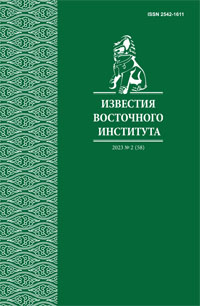Agentivity of somatics in Japanese and the concept of Eastern corporality
DOI:
https://doi.org/10.24866/2542-1611/2023-2/116-126Keywords:
somatics, agentivity, Eastern corporality, Japanese language, cognitive priorityAbstract
This paper presents the results of a syntactic parallel corpora analysis of the functioning of Japanese agentive
somatic structures. It is found that somatics as a subject do not demonstrate agentive features due to the priority of the
animate subject in Japanese. On the contrary, somatic actants as an object obviously show agentive characteristics
as well as carry out the feature of mitigating the human-oriented impact, which is unusual for the Japanese language.
The article manifests the concept of Eastern corporeality, which explains the linguo-cognitive mechanisms of selfawareness by the Japanese in the system of body coordinates. This concept argues that somatics are to be considered
as the nearest interaction circle for Japanese to be controlled and organized, which means somatics’ cognitive salience
in the Japanese understanding of the causative structures describing the body sphere.




